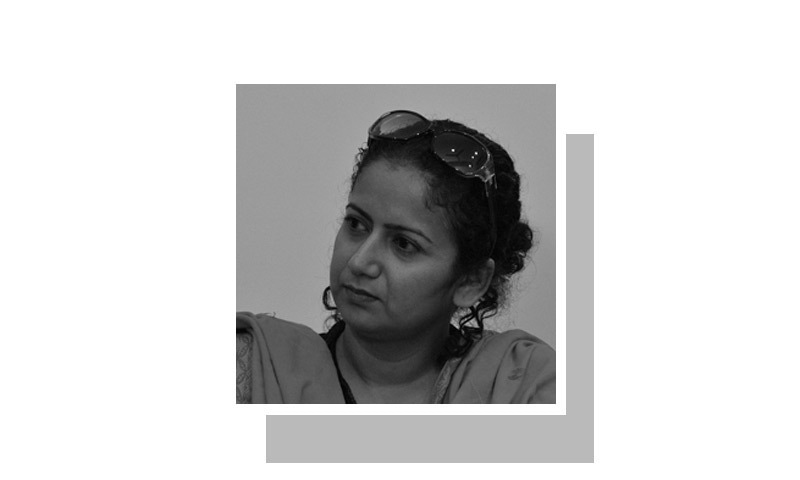CONSERVATIVE lobbies’ reasoning skills mirror that of 18th-century physician Dr Samuel Cartwright. He discovered, diagnosed, and treated a supposed mental illness, ‘drapetomania’, which manifested as an uncontrollable urge to run away. He found that the disease affected only black people — that too, only those in captivity.
Slaves were no longer escaping from their bondage and oppression, but seen only as ‘suffering from’ frenzied foot movement — as involuntary as an allergic reaction. Human rights activists in Pakistan have been subject to a similar diagnosis: that they have irrepressibly manic urges to break up families and traditions, with the same refusal to see a wider context.
They are condemned as Westernised. I wonder how much of West-phobia stems from aversion to the geographic west, and how much of it is a subliminal fear of the metaphoric one. We know both as maghrib. Sunset. Maghrib; the liminal, the transition from one state to another. Maghrib; when (and where) all barriers break down, evil spirits are activated, where jinns wait to invade your body and soul. Ask women about regulations around maghrib; no taking showers, no brushing of or leaving hair open, no using of perfume, no leaving doors open, no going outside or walking under trees. Maghrib is the doorway to inner and outer darkness, the unleashing of the sexual, the moment in which you may be possessed. Flippancy aside, both fears are equally incomprehensible.
While religio-political parties are opportunistic, there are also others who factor: everyday citizens and community leaders invested in maintaining social order. For instance, on one side is an assumed equivalence between human rights and social justice. On the other, is the belief that human rights may lead to an individualism that is considered a violation of social justice.
Take exchange marriages (called ‘watta satta’ or ‘badal’); where a brother and sister are married to another such pair. A man safeguards his sister’s marriage by treating his wife accordingly. If he mistreats her, his sister suffers in kind. This regulatory system avoids dependence on state protection. That people cannot marry whom they want, or that marriage becomes an arena for enacting vengeance, is deemed acceptable and in keeping with social justice — even though in conflict with human rights. If marriage is a tool of governance, the notion of an individual’s right to choose compromises its structure.
The power of intra-community social control has broken down.
While some may condemn child marriages, others may consider 18 years an arbitrary age for legality, given that 15-year-olds work in agriculture, mines and brick kilns. The ‘child’ and ‘adolescent’, as categories, are constructs of modernity. This dissonance resonates across a range of social issues.
Tensions also arc between formal and informal judicial systems. The former is premised on punishing deviant behavior; the jirga on restoring equilibrium. In one, social control rests with the police; in the other, in kinship. In the legal canon, one can plead ‘not guilty’ to a true charge. In the jirga, allegations are not denied; the process is less about establishing guilt, than about offering compensation to restore order. Now that social order is seen as being threatened (mainly by changing gender dynamics), jirgas tend to fixate on women.
Coming back to the importance of context: the traditional system is no longer viable, the power of intra-community social control has broken down. In Fata the maliks can no longer give assurances for clan members, in Balochistan the sardars can no longer control their youth, in Punjab the high volume of litigation in courts indicates that the arbitration power of community leaders has ebbed. Customary punishments (such as banishment from the village) no longer make sense given rising trends in migration, and since income opportunities and survival choices no longer hinge on remaining within the fold of one’s community. Jirgas imposing penalties, on the other hand, has become a source of revenue in Sindh.
Traditional, community-driven solutions worked in insular subsistence villages, bound by common descent and shared visions of common good. Now, given interdependence, exposure, migration, flow of commerce, and conflicts between particular and shared interests, consensus is no longer possible. Conflicting interests need to be mediated in a way that protects the weakest, which is essentially the purpose of democracy. Turning to state laws is now necessary.
But while the state has not implemented laws which protect the equality of citizens, or even taxation, other laws such as qisas and diyat get implemented because they resonate within local power structures.
There’s a quaint illustration from the days of the Raj, of Benazir Bhutto’s great-grandfather, G.M. Bhutto, who apparently lured away the mistress of a British officer, Colonel Mayhew. The officer tried to charge him with instigating the murder of another official; he had the commissioner of Sindh announce a reward for evidence against him, had the FIR extended to Shikarpur to try him on circumstantial evidence, and bribed locals to speak out. He used the full might of the colonial state, but nothing worked, and people stood against the empire in Bhutto’s defence. Eventually, Mayhew burnt his house down. This on the other hand, was just fine with the people, because it was in keeping with local mores of revenge.
But there’s enough evidence that the state can and does change people’s orientation and behaviour when it wants to. Gen Zia’s decade is one long drawn-out example. There’s no reason that it can’t swing the other way — bringing structures more in sync with the times. When the government first introduced daylight saving, it literally changed the time. Now however, the government doesn’t need to initiate change — it just needs to catch up.
The writer is a researcher and consultant in the social sector.
Published in Dawn, April 18th, 2016











































